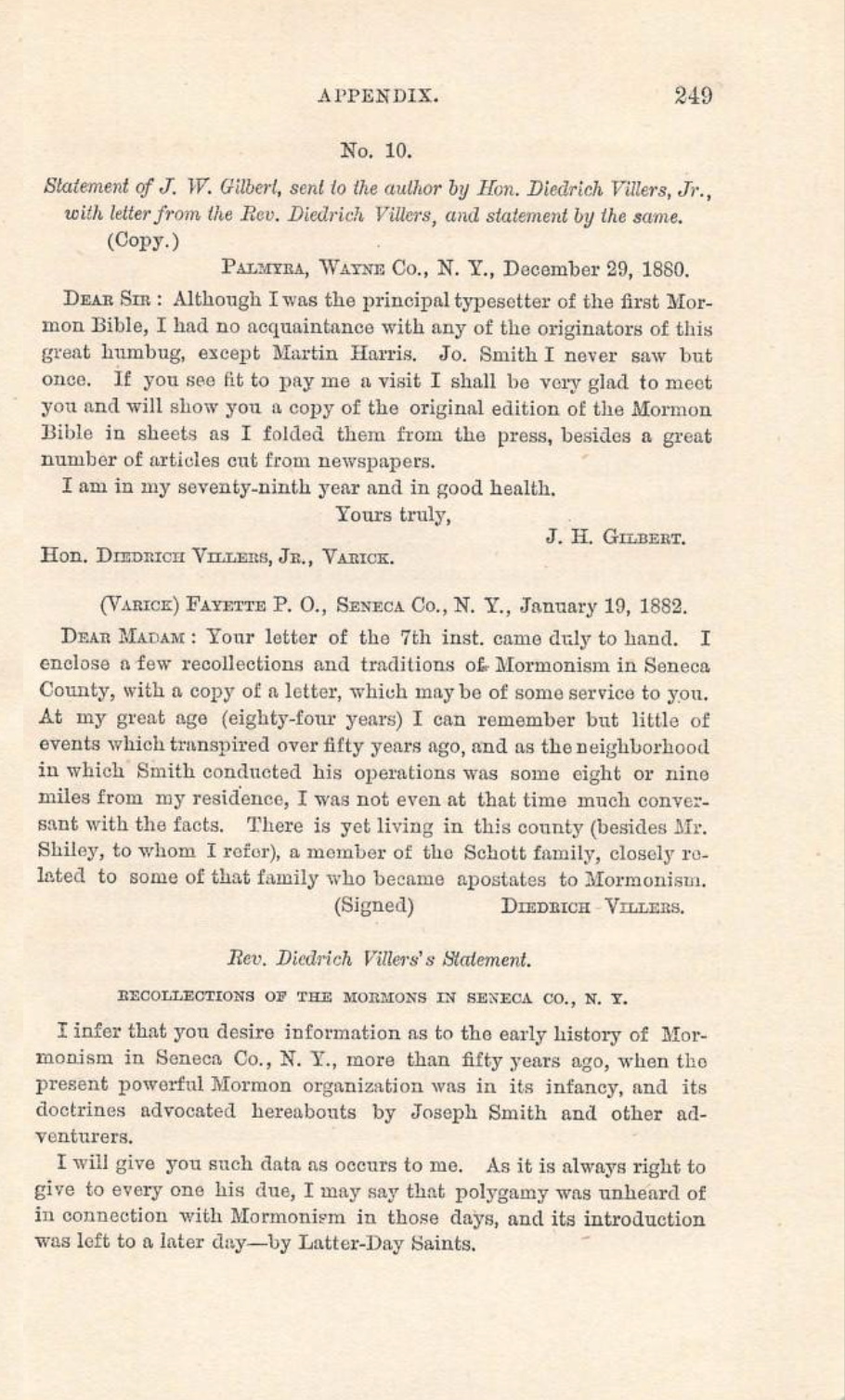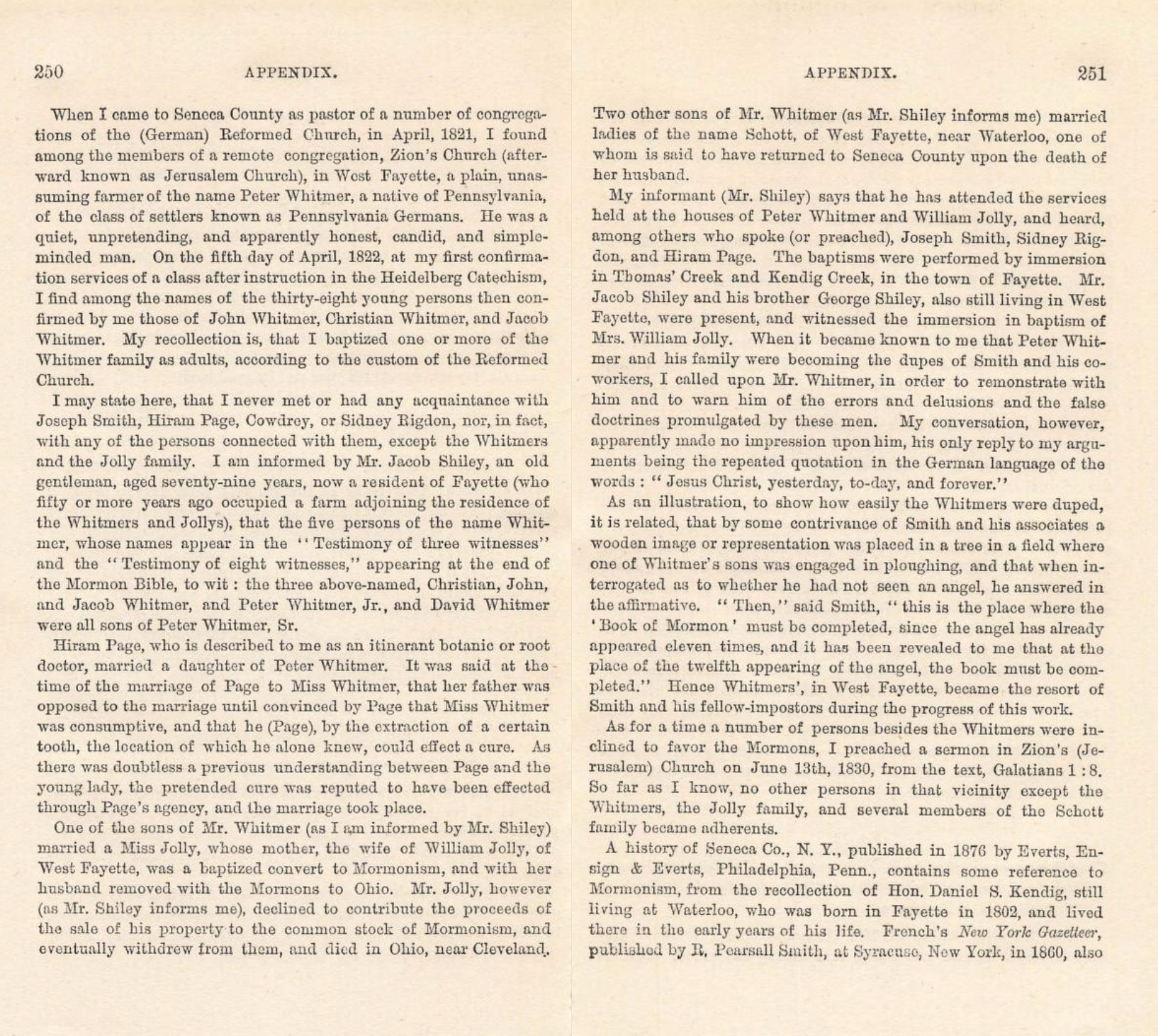Diedrich Willers recalls his relationship with the Whitmer family; says JS tricked them with a fake angel prop.
- Type
- Letter
- Source
- Diedrich Willers CriticNon-LDS
- Hearsay
- 2nd HandLate
- Reference
Diedrich Willers, Letter to Ellen E. Dickinson, January 19, 1882, in Ellen E. Dickinson, New Light on Mormonism (New York: Funk & Wagnalls, 1885), 249–252
- Scribe/Publisher
- Ellen E. Dickinson
- People
- Sidney Rigdon, Jacob Whitmer, Christian Whitmer, Peter Whitmer, Sr., Joseph Smith, Jr., Oliver Cowdery, Diedrich Willers, Jr., John Whitmer, William Jolly, John Hulbert Gilbert, Diedrich Willers, Peter Whitmer, Jr., George Shiley, Hiram Page, Jacob Shiley
- Audience
- Reading Public
- Transcription
(Varick) Fayette P. O., Seneca Co., N. Y., January 19, 1882.
Dear Madam: Your letter of the 7th inst. came duly to hand. I enclose a few recollections and traditions of Mormonism in Seneca County, with a copy of a letter, which maybe of some service to you. At my great age (eighty-four years) I can remember but little of events which transpired over fifty years ago, and as the neighborhood in which Smith conducted his operations was some eight or nine miles from my residence, I was not even at that time much conversant with the facts. There is yet living in this county (besides Mr. Shiley, to whom I refer), a member of the Schott family, closely related to some of that family who became apostates to Mormonism.
(Signed) Diedrich Villers.
Bev. Diedrich Villers's Statement.
RECOLLECTIONS OP THE MORMONS IN SENECA CO., N. Y.
I infer that you desire information as to the early history of Mormonism in Seneca Co., N. Y., more than fifty years ago, when the present powerful Mormon organization was in its infancy, and its doctrines advocated hereabouts by Joseph Smith and other adventurers.
I will give you such data as occurs to me. As it is always right to give to every one his due, I may say that polygamy was unheard of in connection with Mormonism in those days, and its introduction was left to a later day—by Latter-Day Saints.
When I came to Seneca County as pastor of a number of congregations of the (German) Reformed Church, in April, 1821, I found among the members of a remote congregation, Zion’s Church (afterward known as Jerusalem Church), in West Fayette, a plain, unassuming farmer of the name Peter Whitmer, a native of Pennsylvania, of the class of settlers known as Pennsylvania Germans. He was a quiet, unpretending, and apparently honest, candid, and simple-minded man. On the fifth day of April, 1822, at my first confirmation services of a class after instruction in the Heidelberg Catechism, I find among the names of the thirty-eight young persons then confirmed by me those of John Whitmer, Christian Whitmer, and Jacob Whitmer. My recollection is, that I baptized one or more of the Whitmer family as adults, according to the custom of the Reformed Church.
I may state here, that I never met or had any acquaintance with Joseph Smith, Hiram Page, Cowdrey, or Sidney Rigdon, nor, in fact, with any of the persons connected with them, except the Whitmers and the Jolly family. I am informed by Mr. Jacob Shiley, an old gentleman, aged seventy-nine years, now a resident of Fayette (who fifty or more years ago occupied a farm adjoining the residence of the Whitmers and Jollys), that the five persons of the name Whitmer, whoso names appear in the “Testimony of three witnesses” and the “Testimony of eight witnesses,” appearing at the end of the Mormon Bible, to wit: the three above-named, Christian, John, and Jacob Whitmer, and Peter Whitmer, Jr., and David Whitmer were all sons of Peter Whitmer, Sr.
Hiram Page, who is described to me as an itinerant botanic or root doctor, married a daughter of Peter Whitmer. It was said at the time of the marriage of Page to Miss Whitmer, that her father was opposed to the marriage until convinced by Page that Miss Whitmer was consumptive, and that he (Page), by the extraction of a certain tooth, the location of which he alone knew, could effect a cure. As there was doubtless a previous understanding between Page and the young lady, the pretended cure was reputed to have been effected through Page’s agency, and the marriage took place.
One of the sons of Mr. Whitmer (as I am informed by Mr. Shiley) married a Miss Jolly, whose mother, the wife of William Jolly, of West Fayette, was a baptized convert to Mormonism, and with her husband removed with the Mormons to Ohio. Mr. Jolly, however (as Mr. Shiley informs me), declined to contribute the proceeds of the sale of his property to the common stock of Mormonism, and eventually withdrew from them, and died in Ohio, near Cleveland.
Two other sons of Mr. Whitmer (as Mr. Shiley informs me) married ladies of the name Schott, of West Fayette, near Waterloo, one of whom is said to have returned to Seneca County upon the death of her husband.
My informant (Mr. Shiley) says that he has attended the services held at the houses of Peter Whitmer and William Jolly, and heard, among others who spoke (or preached), Joseph Smith, Sidney Rigdon, and Hiram Page. The baptisms were performed by immersion in Thomas’ Creek and Kendig Creek, in the town of Fayette. Mr. Jacob Shiley and his brother George Shiley, also still living in West Fayette, were present, and witnessed the immersion in baptism of Mrs. William Jolly. When it became known to me that Peter Whitmer and his family were becoming the dupes of Smith and his coworkers, I called upon Mr. Whitmer, in order to remonstrate with him and to warn him of the errors and delusions and the false doctrines promulgated by these men. My conversation, however, apparently made no impression upon him, his only reply to my arguments being the repeated quotation in the German language of the word: “Jesus Christ, yesterday, to-day, and forever.”
As an illustration, to show how easily the Whitmers were duped, it is related, that by some contrivance of Smith and his associates a wooden image or representation was placed in a tree in a field where one of Whitmer’s sons was engaged in ploughing, and that when interrogated as to whether he had not seen an angel, he answered in the affirmative. “Then,” said Smith, “this is the place where the 'Book of Mormon' must be completed, since the angel has already appeared eleven times, and it has been revealed to me that at the place of the twelfth appearing of the angel, the book must be completed.” Hence Whitmers’, in West Fayette, became the resort of Smith and his fellow-impostors during the progress of this work.
As for a time a number of persons besides the Whitmers were inclined to favor the Mormons, I preached a sermon in Zion’s (Jerusalem) Church on June 13th, 1830, from the text, Galatians 1:8. So far as I know, no other persons in that vicinity except the Whitmers, the Jolly family, and several members of the Schott family became adherents.
A history of Seneca Co., N. Y., published in 1876 by Everts, Ensign & Everts, Philadelphia, Penn., contains some reference to Mormonism, from the recollection of Hon. Daniel S. Kendig, still living at Waterloo, who was born in Fayette in 1802, and lived there in the early years of his life. French’s New York Gazetteer, published by R. Pearsall Smith, at Syracuse, New York, in 1860, also contained some data concerning Mormonism, and states that the first Mormon society was formed in the town of Fayette, Seneca County, in 1830. In this gazetteer Martin Harris is reported to have mortgaged his farm to defray the expense of printing the Mormon Bible. It was generally reported hereabouts, however, that Peter Whitmer had become surety for paying the cost of printing this Bible, and it may be difficult now to ascertain the exact facts in regard thereto; but as Smith was engaged in preparing the Bible for publication at Whitmer’s house, it is probable that Whitmer also became involved in the expense of publication.
It is conceded, I think, that when Mr. Whitmer disposed of his property in this county he contributed what remained to the Mormon fund, and followed the fortunes of Mormonism. The edition printed of the “Book of Mormon” was, I am told, three thousand copies.
I have a copy of the “Book of Mormon,” by “Joseph Smith, Jr., Author and Proprietor,” bearing the imprint, ‘‘Palmyra. Printed by E. B. Grandin for the Author, 1830.” This is doubtless one of the original copies.
The price of the Mormon Bible when issued was said to have been fixed in the first instance at $1.50 or $1.75 per copy; as the sale at that price was very slow, the price was reduced from time to time by Smith, under instructions from “the angel of the Lord,” until at last copies were offered, I have been told, as low as fifty cents per copy, and even as low as twenty-five cents each.
There is yet living at Palmyra, N. Y., an octogenarian, Mr. J. H. Gilbert, who set type upon the original edition of the Mormon Bible.
[I have taken the liberty of copying for your confidential information a portion of a letter written by him to my son, Diedrich Villers, Jr., who has taken considerable interest in collecting early local history; and should you wish to use any of the facts therein contained, he will doubtless grant permission, should you write to him stating generally that you are advised that he possesses certain information as to Mormonism.]
- Citations in Mormonr Qnas
The B. H. Roberts Foundation is not owned by, operated by, or affiliated with the Church of Jesus Christ of Latter-day Saints.



